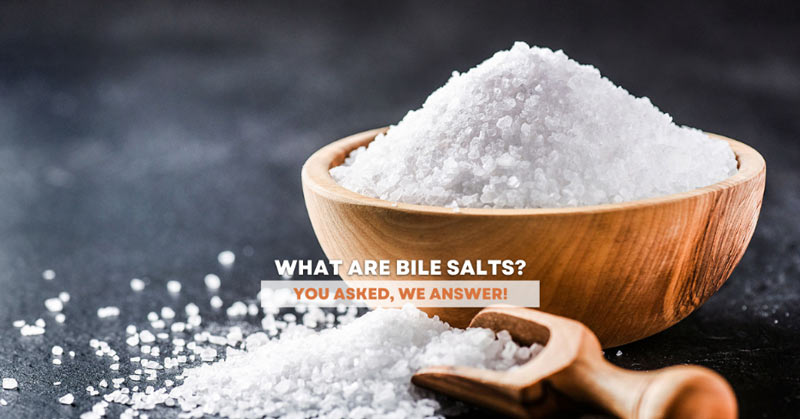What are Bile Salts
Nov 02, 2023 By Madison Evans
Are you familiar with bile salts? These organic molecules are naturally produced in the liver and help to aid in digestion. In addition, they also have various other functions that are beneficial for our overall health. For example, research has indicated they might have anti-inflammatory effects or beneficial impacts on blood lipid levels.
But what exactly are bile salts, and how do they work within the body? If you want information about these essential compounds, deeply dive into this fascinating topic!
Exploring the Role of Bile Salts in Digestion
The liver produces bile salts, which are organic compounds that are kept in the gallbladder. During digestion, they are released into the small intestine, where they aid in breaking fats and lipids. Bile salts are essential for digestion because they help emulsify big fat droplets, facilitating absorption. Bile salts also assist in neutralizing stomach acid and aid in absorbing several vitamins, including vitamins A, D, E, K, and B12.
Bile salts are composed of two principal components: glycocholate and taurocholate. Upon release into the small intestine, these molecules form micelles – tiny structures that allow the fat droplets to mix with the intestinal juices and enzymes for efficient digestion. Bile salts are also important in preventing constipation by activating the migrating motor complex (MMC). This process stimulates contractions in the small intestine, helping food move through quickly.
In addition to aiding digestion, bile salts can also have other beneficial effects on our health. For example, research has indicated that bile salts may have anti-inflammatory properties and cancan lower LDL cholesterol levels in the body. They also support healthy gut microflora by providing a source of energy for certain bacteria.
What are Bile Salts, and How are They Produced
Bile salts are complex organic molecules that play an important role in digestion by helping to break down fats and oils. They are produced primarily in the liver but also occur naturally in certain foods such as egg yolk, fish, and olive oil. Bile salts have a unique chemical structure composed of two primary components: glycocholate and taurocholate.
The liver synthesizes bile salts from cholesterol and other substances. The process of producing bile salts is a highly complex one that involves numerous different biochemical pathways and enzymes. This process begins with converting cholesterol into cholic acid, which is then combined with glycine or taurine to form glycocholic acid or taurocholic acid. These acids are then conjugated with an amino acid or a sulfate group to form bile salts.
The Benefits of Bile Salts for Your Health
1. Improved digestion: Bile salts help to emulsify fat droplets and aid in the breakdown of fats and oils, allowing for better absorption of essential nutrients.
2. Lower cholesterol levels: Research has indicated that bile salts can help reduce total cholesterol and LDL cholesterol levels.
3. Reduced risk of gallstones: Bile salts can prevent the formation of gallstones by keeping cholesterol in solution.
4. Improved gut microflora balance: Bile salts provide energy for certain gut bacteria, helping to keep the microbiome healthy.
5. Reduced risk of constipation: Bile salts can help stimulate contractions in the small intestine, aiding in regular bowel movements.
6. Anti-inflammatory effects: Studies have suggested that bile salts may have anti-inflammatory properties, which could benefit some chronic diseases.
7. Improved absorption of vitamins: Bile salts help improve the absorption of certain fat-soluble vitamins such as A, D, E, and K.
8. Improved liver health: Bile salts play a vital role in detoxification, helping to remove toxins from the body.
9. Improved immune system functioning: Bile salts help support a healthy immune response by keeping the gut healthy and aiding digestion.
10. Reduced risk of cancer: Studies have indicated that bile salts can reduce the risk of certain types of cancer, such as colon cancer.
How to Increase Your Bile Salt Intake
The best way to increase your bile salt intake is to eat foods that naturally contain them, such as egg yolk, fish, and olive oil. You can also supplement with a bile salt formula if necessary. Additionally, eating foods rich in dietary fiber can help stimulate the production of bile salts in the liver. Finally, drinking plenty of water can help keep bile salt levels balanced.
Foods Containing High Levels of Bile Salts 
Certain foods contain high bile salts, making them great dietary sources for this essential compound. Egg yolks are one of the best sources, as they contain glycolic and taurocholic acid.
Fish oil is another excellent source that provides glycocholate in particular. Olive oil also contains bile salts in much lower amounts than egg yolk and fish oil. Vegetables such as carrots, cauliflower, and broccoli are also good sources of bile salts.
In addition to these common foods, there are some less common sources of bile salts. For example, artichoke extract has been shown to contain significant amounts of glycocholic and taurocholic acid and other bile salts. Another interesting source is a bitter melon extract, which has been found to contain a variety of bile salts that are important for detoxifying the body and regulating cholesterol levels.
Potential Side Effects and Risks of Taking Too Much Bile Salt
Before supplementation, the potential side effects and risks of taking too much bile salt should be considered. Taking too much bile salt can lead to excessive levels in the body, which can cause gastrointestinal distress, nausea, and abdominal cramping. High bile salts may also increase the risk of gallstones forming or aggravating existing gallbladder problems. Too much bile salt can also imbalance other important electrolytes, such as sodium and potassium.
Bile salts are usually safe when taken as directed, but it is possible to take too much. If you experience any side effects after taking a bile salt supplement, stop using it immediately and consult with your doctor. Taking too much bile salt can also raise the risk of potentially harmful interactions with other medications, so it is important to inform your doctor if you are taking any other prescription or over-the-counter medications.
FAQs
Q: What is the role of Bile Salts in digestion?
A: Bile salts are primarily responsible for aiding the digestion of dietary fats. Through a process known as emulsification, bile salts break down large fat particles into smaller ones to help increase their surface area and make them more readily available for absorption. This makes them easier for the body to process and assimilate.
Q: Are there any other benefits of Bile Salts?
A: Research has indicated that bile salts may have additional beneficial effects, such as anti-inflammatory properties and an impact on blood lipid levels. They also promote intestinal health by helping to regulate gut flora and protect against harmful pathogens. Finally, bile salts reduce the risk of cancer and heart disease.
Q: Are there any potential side effects?
A: Bile salts are generally considered safe when taken in appropriate amounts, but it is important to note that they can sometimes interact with certain medications or cause other adverse reactions in people with certain medical conditions. If you are considering taking a bile salt supplement, it is always best to consult your doctor first to ensure it is safe.
Conclusion
Bile salts are essential to our bodies and provide numerous beneficial functions. They help break down dietary fats, promote intestinal health, and potentially have several other health benefits. However, it is important to remember that bile salts can interact with certain medications or cause adverse reactions in some people, so it’s best to speak with a doctor before taking any supplement. With that said, when taken in appropriate amounts, bile salts can be an excellent way to support overall health and well-being!







